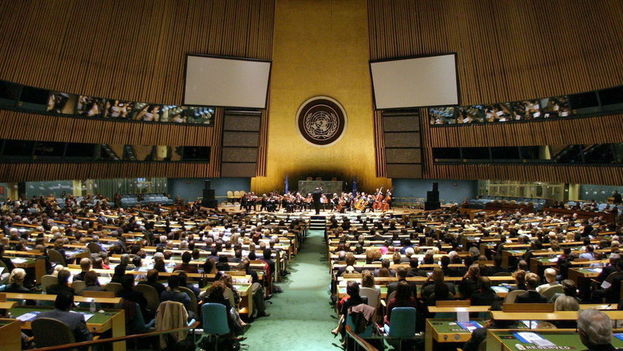
![]() Pedro Campos, Miami, 2 November 2017 – Once again, as expected, the United Nations condemns the United States embargo on Cuba. This annual exercise is part of the diversionary masquerade of the Castro regime to try to make the naïve believe that it is the United States that is the main culprit in Cuba’s economic and social disasters, not the internal blockade to which the regime itself has subjected the Cuban people.
Pedro Campos, Miami, 2 November 2017 – Once again, as expected, the United Nations condemns the United States embargo on Cuba. This annual exercise is part of the diversionary masquerade of the Castro regime to try to make the naïve believe that it is the United States that is the main culprit in Cuba’s economic and social disasters, not the internal blockade to which the regime itself has subjected the Cuban people.
The US embargo, aimed at trying to affect the regime’s economy, is based on the fact that the Cuban dictatorship violates the civil, political, economic and social rights of the Cuban people and grounded in the assumption that the pressure of the embargo would force the Cuban regime to assume a democratic transition process.
If anyone had doubts about these violations, it would be enough to observe what the regime has just done with the opponents and dissidents who tried to present themselves to be nominated as candidates for grassroots delegates to the Popular Power; or simply to follow the records of the opponents and dissidents detained, imprisoned, beaten or forcibly prevented from participating in national or international events.
But in reality, the embargo never achieved its purpose of forcing the regime to that democratic transition, while the Castro government counted on the help of the USSR and the “socialist camp” first, and later that of Venezuela in the golden age of oil.
Now, as the USSR and the socialist camp have disappeared and Venezuela is going through a political and economic crisis, with no prospects for a solution favorable to the Castro regime in the short term, those who believe in the effectiveness of the embargo have new hopes that it could have an effect.
It should also be noted that the Cuban rulers have never suffered the direct consequences of the embargo. They continue to live like kings. They live in luxurious mansions and entertain themselves in the best Cuban landscapes, they have the best cars and yachts, they have hunting grounds, airplanes, the best possible medical attention, they enjoy the most exquisite delicacies and spend all the money they need at the cost of fleecing Cuba’s wage slaves.
But it is no less true that economic difficulties have led the regime to have to make some concessions to the private economy and foreign investment, which they always manage at will, without clear laws, with abusive taxes and absurd prohibitions.
If the Cuban leaders were really interested in eliminating the embargo, they could achieve it very easily if they declared an amnesty for political prisoners, decreed the freedoms of expression, association, election and economic activity and allowed a multi-party system and a free market.
But they consider that this would be “to surrender” to imperialism, when in truth what they would be doing is lifting the internal, economic, political and social blockade that they have imposed on the development of Cubans and their economy in the name of a socialism that has never existed.
In the end, the fear of losing power is the real cause of all this handling of the embargo and the internal blockade. A few measures already taken with regards to private work and other measures successfully confront the state, offering better services and salaries.
The Castro regime is, thus, more and more statist than the Chinese and the Vietnamese, who have yielded in economic power but closed any alternative option to political power. Here, they are unwilling to cede even that.
The entire international community, except Israel, lends itself to the Castro regime for two fundamental reasons: first, because the embargo provisions, which are not always applied, apply to investments in Cuba of foreign capital and trade with other countries, due to their extraterritorial clauses; and secondly because for many it is the only way they have to “stand up to the tiger.”
The Ministry of Foreign Affairs presents the event as a great triumph of the regime’s diplomacy, knowing that many of those who support it in this “battle” are very clear that this is a dictatorial government, a violator of the human rights of the Cuban people.
It also does it to throw a crumb of solidarity, for Cuba’s “contributions” to health and education and as compensation for other negotiations in the UN, where Cuba can support others with its votes for some help from Unesco, the World Food Program, or on issues that demand support in negotiations.
The Castro dictatorship, flagrant, massive and a systematic violator of the civil, political, economic and social rights of the Cuban people, with its internal blockade, is the main obstacle to the economic development of Cuba. Its entire “fight” against the US embargo is a mask very well rehearsed for the vote in the UN in times of Halloween.
